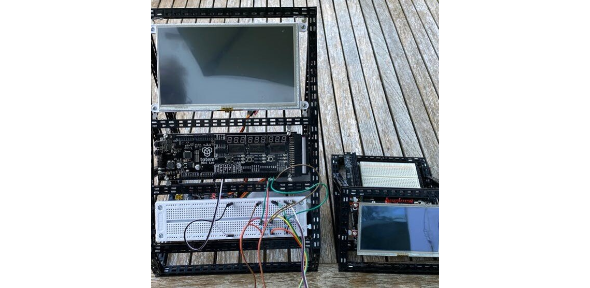
Submitted by Prof Jim Haseloff on Fri, 15/05/2020 - 09:57
Jim Haseloff, Francesco Ciriello and Maziyar Jalaal discuss OpenPlant Biomaker Design2020, a collaborative project to develop low-cost reactors for molecular diagnosis. The project aims to develop open-source bioreactors with potential applications for COVID-19 and viral diagnosis.
Modern biology has exploited enzymes and clever reaction systems to produce an ever growing range of diagnostics, environmental assays, DNA assembly and tools for education and research. Many of these molecular reactions are cheap and accessible, but require instrumentation for precise temperature regulation, programmed control over time and quantitative readout. Commercially available instruments are expensive, employing milled metal components for temperature control of hundreds of samples. There are many cases where low cost (<<£100) reactors would be very useful, even if sacrifices were made for the scale of sample numbers or flexibility or speed of temperature control. We have taken on the challenge of exploring new open solutions for ultra low cost micro-incubators. At the beginning of the COVID-19 lockdown, we set up an international Biomaker expert group to tackle this. Currently, around 75 participants and observers are connected via web exchange and regular teleconferencing. We have built: (i) a programmable rig for testing prototypes. The integration of no-code programming and programmable touchscreen means that the instrument can be highly flexible, and easily repurposed. (ii) This has inspired the assembly of a small control unit that can be used for low-cost implementation, after the testing process. (iii) Quantitative models for air flow and heat transfer to inform new designs and computer control. Air heating/transfer can potentially provide a cheaper and more accessible routes to incubator design, compared to the conventional use of heaters attached to milled aluminium blocks. (iv) We have incorporated cheap heating hardware into custom 3D printed housings and are testing the designs.
For more information about how the project has developed so far, you can read the full article on the OpenPlant website >>
Written by Jim Haseloff (Plant Sciences, University of Cambridge), Francesco Ciriello (Mathworks, Cambridge) and Maziyar Jalaal (Department of Applied Mathematics and Theoretical Physics, University of Cambridge).

